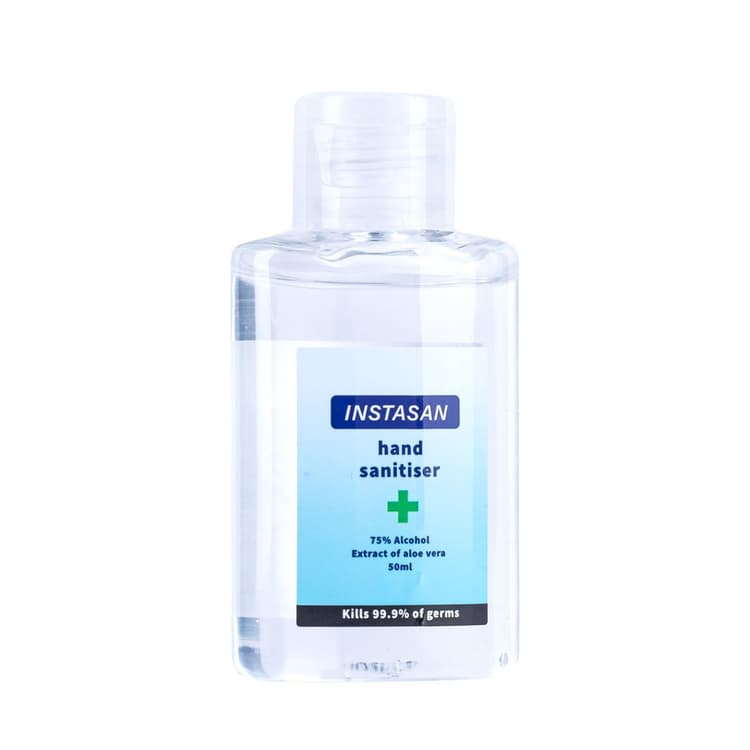Christmas Delivery: Please note orders placed after 2:30pm on 18th December may be delivered after Christmas.
- Home
- General Health
- Face Masks
- Hand Sanitiser (Hand Sanitiser Dispenser)
Hand Sanitiser (Hand Sanitiser Dispenser)

Hand sanitiser is advisable for use in situations where you cannot wash your hands, such as when using public transport or when out at events. This hand sanitiser kills germs and eliminates bacteria without the need for water, while also expelling odour. At UK Meds, you can get a hand sanitiser dispenser for your convenience, stay clean and hygienic on the go.
For customers in Nottingham - receive your order in as little as 20 minutes with Deliveroo.
No refunds or returns.
- Eliminates bacteria
- Works instantly
- 500ml bottles available
- Gets rid of odours
- Doesn't require water
- 100ml & 500ml made in the UK
More information
What is a Hand Sanitiser?
Hand Sanitiser Dispenser
A hand sanitiser is a lotion that is applied to the hands that will kill bacteria and viruses. Hand sanitiser typically comes in the form of a hand sanitiser dispenser. Some hand sanitisers are made of alcohol, with a minimum alcohol content of 60%. There are also non-alcohol solutions that will kill viruses on hands. We sell both types here at UK Meds. Hand sanitisers are excellent for people who wish to clean their hands in places where it is not convenient to use soap and water.
Are hand sanitisers effective against viruses?
You may be interested in whether hand sanitisers are effective against the Coronavirus. The truth is that hand sanitisers, in the form of alcohol rubs, are more effective against viruses (such as the Coronavirus) than simply washing hands with soap and water.
Use of alcohol-based hand gels dries skin less, leaving more moisture in the epidermis, than handwashing with antiseptic/antimicrobial soap and water.
How do you use hand sanitiser?
Hand Sanitiser Instructions
When using an alcohol-based hand sanitizer:
- Apply product to the palm of one hand.
- Rub hands together.
- Rub the product over all surfaces of hands and fingers until hands are dry.
- The current evidence for school hand hygiene interventions is of poor quality.
What are the benefits of hand sanitiser over washing your hands?
The US Centers for Disease Control and Prevention (CDC) instructs people to wash their hands frequently in order to avoid spreading of viruses. In cases where soap and water are not available, alcohol-based hand sanitisers are recommended.
If you are attempting to avoid viruses on-the-go, hand sanitisers are convenient. Both washing hands and using hand sanitisers are good practices for avoiding the spread of or being infected with, Coronavirus.
| Hand Sanitiser | Hand Sanitiser UK |
|---|---|
| Buy Hand Sanitiser | Hand Sanitiser Online |
| Hand Sanitiser for Coronavirus | Hand Sanitiser Online |
| Where to buy Hand Sanitiser in the UK | Buy Hand Sanitiser UK |
Buy Hand Sanitiser
Where can I buy hand sanitiser online?
In the UK, you can buy Hand Sanitiser from UK Meds. We have overnight shipping most nights of the week. Also consider getting a FFP2 (N95) face mask to help filter the air you breathe. FFP2 are the minimum recommended face masks recommended for health care providers to avoid contracting the Coronavirus.
If you wish to buy a FFP3 face mask, we also have these. Hand sanitiser and face masks ship overnight most nights of the week from UK Meds. You can know the expected date of delivery as you check out.
More information
- Hand Sanitisers and Other Personal Protective Equipment
- Your Questions About Hand Sanitiser Answered
- The Role of PPE in Fight Against Covid-19
- How Do Hand Sanitisers Help vs Coronavirus?
- Spring Cleaning During a Pandemic
- Hand Sanitiser vs Soap and Water vs Coronavirus
- Top 10 Health Hygiene Tips
- Do Hand Sanitisers Work?
- Things to Buy During Coronavirus Outbreak
Here to help you
Our Customer Service is available Monday to Friday 9am - 5pm. If you need urgent assistance, do not use this service. Call 111, or in an emergency call 999. Visit our help section


